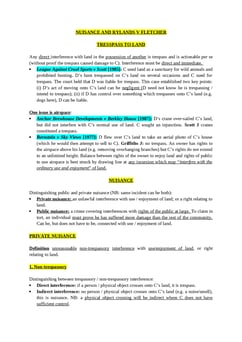Smith v Littlewoods [1987] AC 241
Judgement for the case Smith v Littlewoods
KEY POINTS
Negligence refers to situations where a duty of care arises.
The duty of an occupier entails a responsibility to ensure the safety of their premises for visitors or guests. The duty of care towards neighbors includes taking reasonable steps to prevent harm or damage to adjoining properties.
The extent of liability in negligence cases varies depending on the circumstances and the level of care exercised by the defendant.
In damage to adjoining premises, an occupier may be held liable if their negligence or failure to maintain their property harms or damages neighboring properties.
Negligence claims can arise from damage caused by an unauthorized act of a third party. In such cases, liability may depend on foreseeability and the reasonable measures taken to prevent or mitigate the harm caused by the third party's actions.
FACTS
Vandals started a fire at a cinema, damaging nearby properties. The cinema owners faced negligence allegations in court. The UK's House of Lords ruled that there isn't a universal duty to prevent intentional harm caused by third parties. They clarified that a general obligation to anticipate harm from third-party wrongdoing isn't automatically assumed.
The Lords highlighted the impracticality of creating a one-size-fits-all rule for cases where negligence involves unauthorized acts by independent third parties on premises owned or occupied by the responsible party. Each situation should be assessed individually.
The house determined that the cinema owners couldn't have reasonably foreseen the fire caused by vandals due to the absence of prior knowledge about their repeated intrusion and attempts to start fires. As a result, the cinema owners weren't inherently obligated to prevent the vandals' access or their unlawful fire-starting.
JUDGEMENT
The distinguished House found that the cinema owners cannot be held in breach of their general duty of care owing to the absence of a foreseeable nexus between their actions and the unfortunate fire incident.
Consequently, the allegations of negligence brought against them were not substantiated, and the case was ruled in favor of the cinema owners.
COMMENTARY
In negligence cases involving third-party harm, based on duty of care responsibilities like ensuring premises' safety and preventing harm to neighbors. Liability varies based on circumstances and care level. The case involves vandals causing fire damage.
The House of Lords ruled no universal duty to prevent third-party intentional harm, favoring case-by-case evaluation. Lords found cinema owners couldn't foresee fire due to no prior knowledge, absolving them of negligence. Unique circumstances dictate liability in negligence cases.
ORIGINAL ANALYSIS
R bought a building that he intended to demolish. Some children got in several times and eventually started a fire that caused damage to Plaintiff’s adjoining property. Plaintiff said that since R had failed to provide security for the building, it was Plaintiff’s negligence that caused the damage to the adjoining property.
HL said R was not liable since it was not “reasonable” to foresee an empty building as a fire hazard and R had no known of the children’s previous attempts to set fire to the building. Therefore there could not be no duty of care was owed.
NB Anns still in effect in 1987 and therefore “proximity” was being judged mainly by whether the damage to Plaintiff should have been “reasonably foreseeable” to R.
Lord Goff
There are special circumstances where R can be liable for the acts of 3rd parties: Where there is either a special relationship between R and the third party OR between R and the victim.
RELATED CASES
For Further Study on Smith v Littlewoods
Need instant answers? Our AI exam tutor is here to help.
Ask questions 🙋 Get answers 📔 It's simple 👁️👄👁️
Our AI is educated by the highest scoring students across all subjects and schools. Join hundreds of your peers today.
Get StartedSimilar Cases
Related Product Samples
These product samples contain the same concepts we cover in this case.
| Tort Law | Negligence Duty Of Care Notes (35 pages) |

 Since 2010, Oxbridge Notes has been a trusted education marketplace, supplying high-quality materials from top achievers at universities like Oxford, Cambridge, LSE, Harvard, and Yale.
Since 2010, Oxbridge Notes has been a trusted education marketplace, supplying high-quality materials from top achievers at universities like Oxford, Cambridge, LSE, Harvard, and Yale.